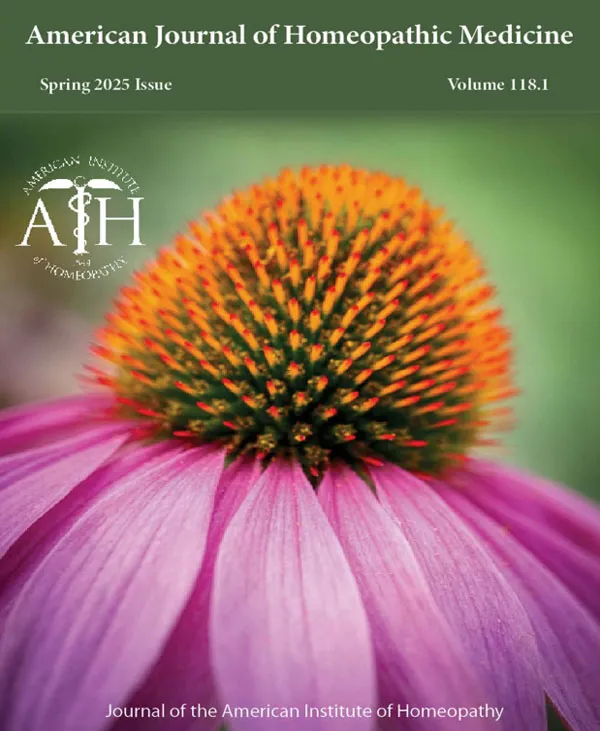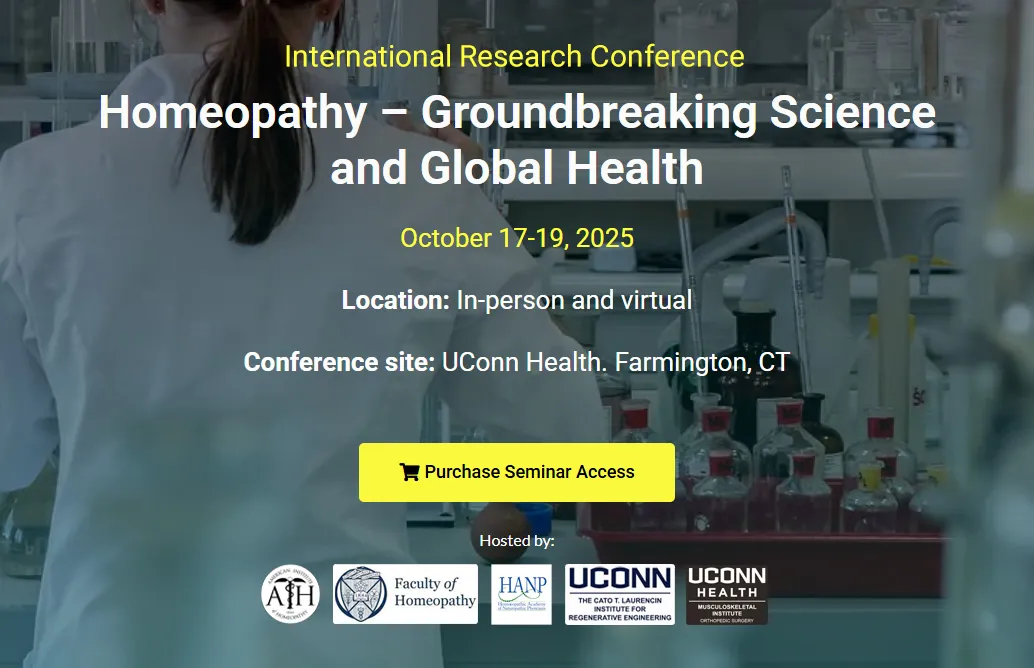
AIH Response to Washington Post
To the Editor
Your recent Washington Post column in Health and Science, December 21, 2015, by Consumer Reports (CR) warrants comment.
As president of the American Institute of Homeopathy, America’s oldest extant national medical association, I was surprised and dismayed that the Washington Post chose to print CR’s opinions without seeking evidence from experts in the field.
In forming hisconclusion, the chief medical advisor at CR utilized a single controversial study funded by the Australian government,[1] while ignoring a similar study by the Swiss government[2] that reached entirely different conclusions. One of the most serious methodological problems with the Australian study was the researchers’arbitrary decision to limit analysis to only large studies, a technique noted by the British Medical Journal (BMJ) to have serious limitations.[3] Other investigators intent on debunking homeopathy have resorted to similar means.[4]
Interestingly, the authors of the Australian study also chose to ignore one of the largest demonstrations of homeopathic medicine in history, a study performed in Cuba involving over two million participants and demonstrating remarkable benefits. [5]
It is no secret that Homeopathy is the second most commonly used form of alternative medicine worldwide and is used by more than 500 million people including tens of thousands of physicians. In the US less than three percent of the population currently use it, but sales of OTC homeopathic medicines have crossed the billion dollar-per-year benchmark. This is clearly a result of increasing public interest in safer, more effective means of treatment, which is no wonder, considering the abysmal safety record of conventional pharmaceutical medicine[6] and the epidemic of chronic illness now affecting virtually every society using those drugs.[7]
On one hand, homeopathy has finally begun to garner the attention that it deserves, even though that started by it being the target of negative editorials and blogs in many journals and websites. These negative blogs usually end up being swamped by opposing positive comments from individuals who have actual first-hand knowledge of homeopathy, providing an important balance to the authors who write without any direct experience in the field.
The debate about homeopathy is not new. It has raged for more than two centuries and divided the medical community in two. Naysayers and practitioners of homeopathy have been arguing since homeopathy was first born, the child of Samuel Hahnemann, MD, a brilliant 18th century scientist and scholar of medicine.
Despite early criticism, homeopathy spread like wildfire around the world. Its clinical efficacy in virtually every epidemic and medical condition offered the most dramatic proof of its veracity. Even though homeopathically treated patients had mortality rates that were orders of magnitude lower than those conventionally treated in the Great Influenza Pandemic of 1918-19, critics claimed then, as they do now, that homeopathy couldn’t possibly work, and therefore doesn’t work! The critics of Copernicus, Galileo and Einstein said the same, yet in each case, the existing status quo was shattered by the pure objective fact that the evidence was real, and merely represents a more detailed view of reality.
In the case of homeopathy, skeptics frequently claim that there is a lack of science to support its efficacy, yet researchers have produced thousands of high quality reports spanning the entire range of possible investigations. These include both in vitro and in vivo laboratory studies, randomized double-blinded clinical trials in humans and animals, observational studies, clinical effectiveness research (CER), systematic reviews, and meta-analyses. For a partial listing of these studies, see the website of the American Institute of Homeopathy.[8]
Not every single study favors homeopathy, but a majority of quality scientific research does demonstrate that homeopathy is different from, and superior to, placebo in both basic science and clinical application and that much more research is warranted.
Finally, even when the evidence from well-designed studies demonstrate homeopathy’s effectiveness, critics remain undaunted:
The amount of positive evidence even among the best studies came as a surprise to us. Based on this evidence we would readily accept that homeopathy could be efficacious, if only the mechanism of action were more plausible. [9] (emphasis mine)
This leaves us at an ugly impasse: rigorous scientific study through many different types of investigative analyses does confirm that the basic premise of homeopathic treatment and its application is sound and efficacious. Additionally, homeopathy has been used in the field, for a wide variety of conditions, in most countries on earth, for more than two centuries with astoundingly beneficial results. Yet, the staunchest and most conservative elements of the medical establishment refuse to pay credit where it is due:
We should start from the premise that homeopathy cannot work and that positive evidence reflects publication bias or design flaws until proved otherwise. [10]
So called objective scientists have even gone so far as to decry homeopathy as unethical because of the possibility that if it does work it would threaten the cornerstone of scientific methodology.[11] When, in fact, completely the reverse is true: failing to accept homeopathic science purely on the basis of a rigid ideology (that it could not and therefore must not be true) is a defiance of science itself, in favor of dogma, belief and perhaps fear.
A scientific mind, by definition, is a mind open to proof, even if it forces the recognition of the need for a paradigm change. Science is the unbiased investigation of phenomenology as a method seeking to explain how the universe works. Discussions of homeopathy inevitably boil down to the use of the word science being used as a shield to protect an institution from facing an inevitable truth: that healthy living systems benefit most from modalities that favor self-regulation, as opposed to pharmacologic manipulation.
According to an expert formerly of the National Cancer Institute, not only is our medical system built to be inflexible , because it discourages unorthodox practices but:
At this date, we are not limited by the science; we are limited by our ability to make good use of the information and treatments we already have. [12]
The entire argument against homeopathy may be nothing more than a smokescreen to prevent the public from seeing the truth about conventional pharmacologic medicine: that it is almost entirely unscientific,[13] that it is extremely harmful to use, and that it is the instrument of one of the largest industries on earth. It would be truly frightening if our medical profession were to admit that the acme of modern pharmaceutical medical care is often more harmful than its alternative: homeopathy.[14]
Footnotes
[1] https://www.nhmrc.gov.au/_files_nhmrc/publications/attachments/cam02_nhmrc_statement_homeopathy.pdf
[2] Bornhoft, Gudrun, and Matthiessen, Peter F. Homeopathy in Healthcare: Effectiveness, Appropriateness, Safety, Costs. Goslar, Germany: Springer, 2011. http://rd.springer.com/book/10.1007/978-3-642-20638-2/page/1
[3] http://www.bmj.com/content/346/bmj.f2304 (accessed online 12/23/15)
[4] Shang A, et al. Are the clinical effects of homeopathy placebo effects? Comparative study of placebo-controlled trials of homeopathy and allopathy. Lancet 2005;366(9487):726-32.
[5] Bracho G, et al.Large-scale application of highly-diluted bacteria for Leptospirosis epidemic control. Homeopathy 2010;99:156-166.
[6] Bates DW, Cullen DJ, Laird N, Petersen LA, Small SD, et al. Incidence of adverse drug events and potential adverse drug events . Implications for prevention. JAMA 1995;274:29-34.
[7] Milani RV. Lavie CJ. Health Care 2020: Reengineering Health Care Delivery to Combat Chronic Disease. Am J Med. 128(4):337-343.
[8] http://homeopathyusa.org/guide-to-research.html (accessed online 12/23/15)
[9] Kleijnen J, Knipschild P, Ter Riet G, Clinical trials of homeopathy. Br Med J 1991;302(6772):316-23.
[10] Baum, Michael and Edzard Ernst, Should We Maintain an Open Mind about Homeopathy? The American Journal of Medicine, Vol. 122, No. 11, pp. 973-974 (November 2009).
[11] Smith, K., “Against Homeopathy — A Utilitarian Perspective,” Bioethics, 14 February 2011, pp. 1-12.
[12] DeVita VT. The Death of Cancer: After Fifty Years on the Front Lines of Medicine, a Pioneering Oncologist Reveals Why the War on Cancer Is Winnable–and How We Can Get There. Farrar, Straus & Giroux, NY 2015.
[13] http://clinicalevidence.bmj.com/x/set/static/cms/efficacy-categorisations.html
[14] Anupam B., et al. Mortality and Treatment Patterns Among Patients Hospitalized With Acute Cardiovascular Conditions During Dates of National Cardiology Meetings. JAMA Intern Med. 2015;175(2):237-244. doi:10.1001/jamainternmed.2014.6781. (accessed online 12/23/15)
Latest News & Updates
Latest Issue of the AJHM
AJHM – Spring 2025
Volume 118 Number 1
Table of Contents
- Editorial: In this issue
- President’s Message: Our Guiding Precepts
- Homeopathic PuZZle?
- Alchemy, Spagyrics, and Homeopathy: Tracing the Threads of Energetic Medicine
- The Genius of Fluoricum acidum: Part One
- An Interesting Case of Kola
- Book Review: ‘Lessons in Pure Homeopathy, From the Writings of Hahnemann’s Best Student and Medicine’s Most Successful Practitioner, Adolph Lippe, MD’ – Edited & Annotated by A. Saine, ND
- Book Review: ‘Folkways and Homoeopathy: Our Ancestral Secret of Healing’ by Shailendra Ramchandra Vaishampayan





